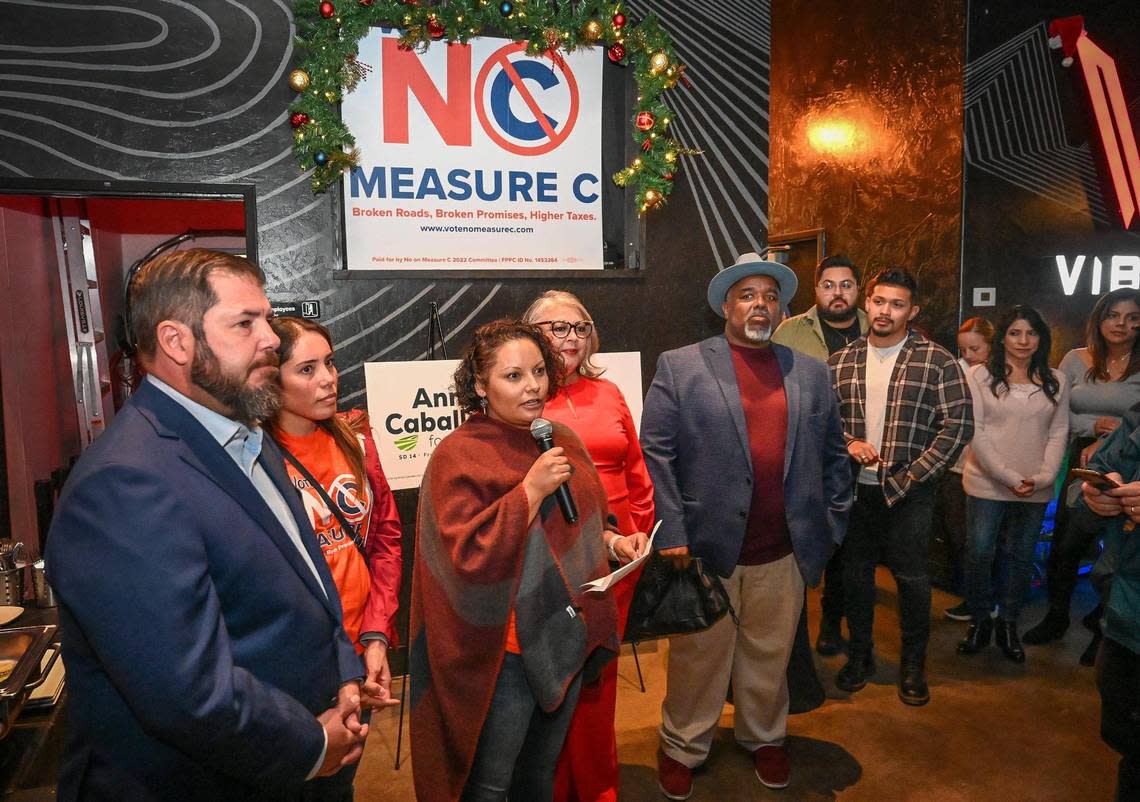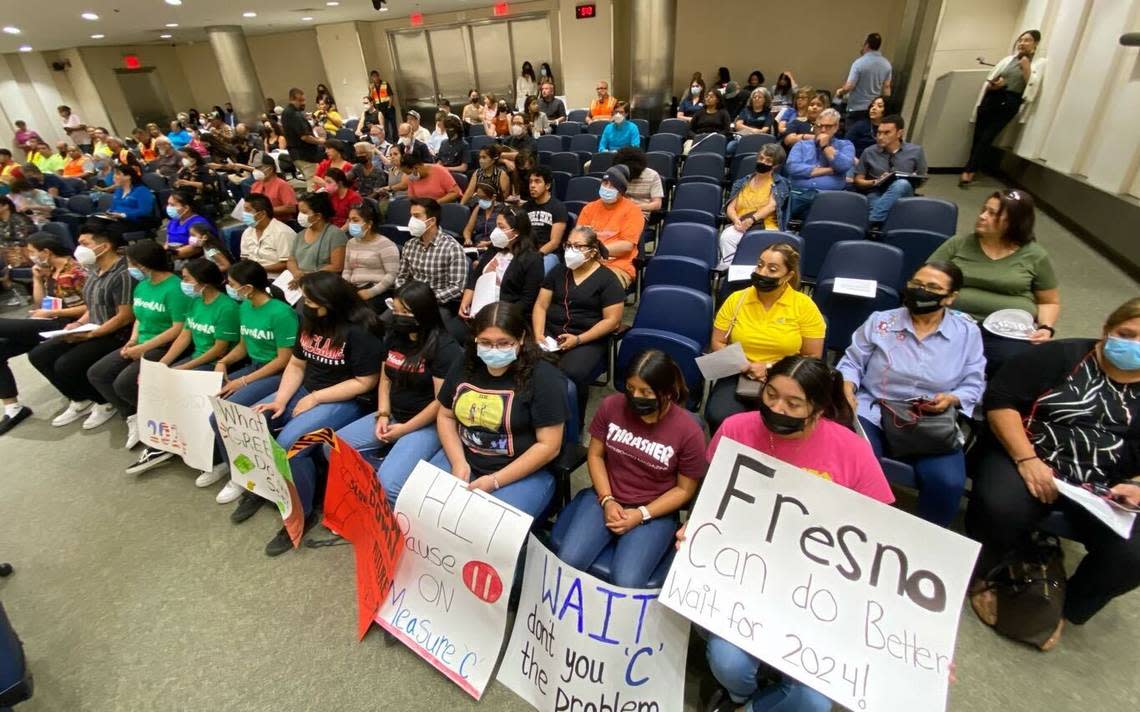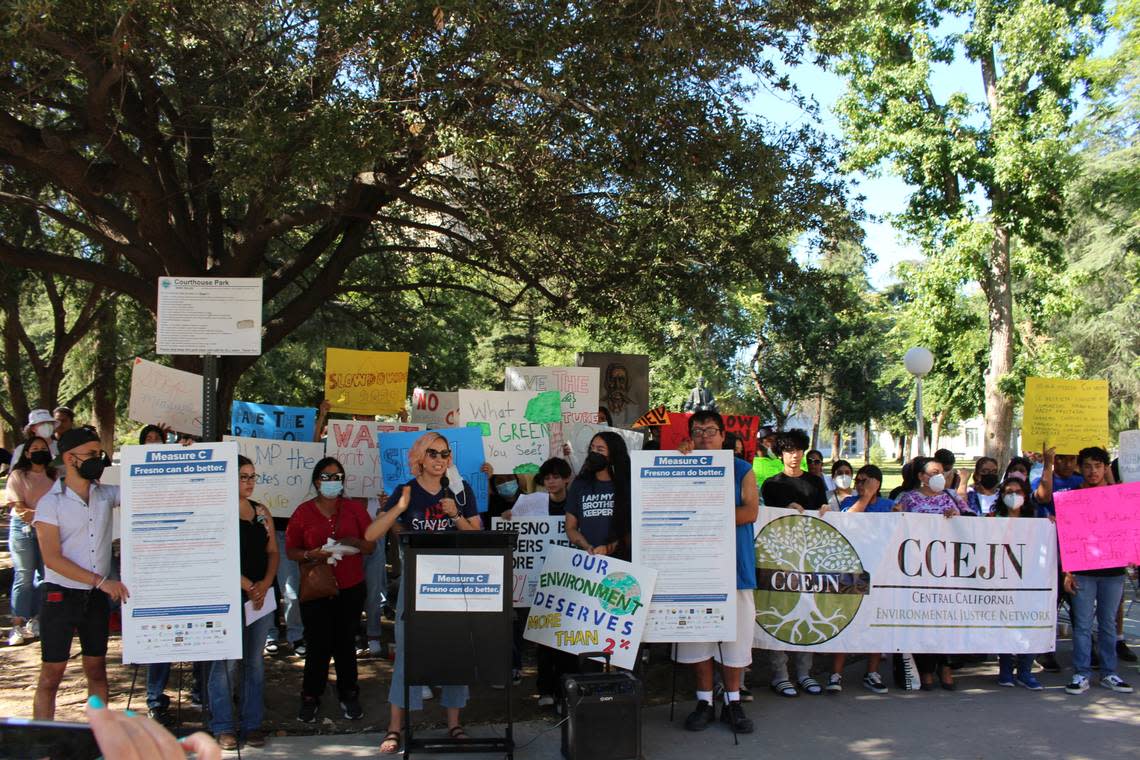Road to nowhere: Fresno County’s $7 billion Measure C renewal fails. Now what?
This story was originally published by Fresnoland , a nonprofit news organization dedicated to making policy public.
With more than 180,000 votes tallied so far, this fall’s attempted Measure C renewal has likely failed to gain enough support at the ballot. Fresno County’s proposed 30-year, $7 billion transportation spending plan is currently reporting at 58% — short of the two-thirds vote it needs to pass. And with 20,000 votes still to count, the spending plan will have to win nearly 90% of the remaining uncounted ballots to pass.
Local leaders now have two more election cycles – 2024 and 2026 — to put together a new plan for the county’s half-cent transportation sales tax before the current version of it expires in 2027. In the meantime, the county’s local transportation programs will continue to be funded by Measure C.
“Fresno County voters’ rejection of Measure C sends a clear message to politicians that they can’t make decisions for us without us, or spend our tax dollars without our guidance,” a statement by the No on Measure C Committee noted.
“We know we deserve better. Now is the time to chart our own path forward, a path that leads us to an inclusive transportation plan that is truly reflective of community needs and opportunities.”
Fresno Mayor Jerry Dyer said that while he is encouraged by Measure C’s support at the polls, he was not surprised by the eventual failure of the renewal campaign he led.
“I am disappointed, but not surprised, by Measure C’s outcome. Having to overcome a two-thirds vote threshold is a very difficult task, especially when considering the nation is experiencing inflationary rates not seen in 40 years,” Dyer said in a statement to Fresnoland.
Road-heavy vision rejected at the polls
For the last eight months, the Measure C spending plan has encountered opposition from scores of organized groups.
The Democratic and Republican parties in Fresno County, four labor unions (three in the building trades, and the Fresno Unified teachers union) and some of the region’s leading community organizations all opposed the spending plan this fall.
The primary pitch of Measure C was simple: spend the lion’s share of Fresno County’s future Measure C revenues — into 2057 — on asphalt and concrete repaving projects because heavy-duty truck traffic, from the logistics and agricultural industry, has taken a heavy toll on county roads, leading to a $1.7 billion maintenance funding shortfall.
Local planners wanted taxpayers to foot this maintenance bill. Citing internal polls that showed the top priority for county voters was repaving local roads, the $7 billion Measure C proposal increased the share of local sales tax revenue that goes to road maintenance by $1.5 billion to $2 billion.
With billions of dollars going to street rehab, the spending plan was primarily designed to improve Fresno County’s average road condition over the next 20 years.
But in doing so, other priorities had a hard time making their way into the spending plan appproved by the renewal committee. The plan’s squeeze on public transit (40% cut) and bike trails (66% cut) became points of concern for the community groups who led the opposition campaign.
Another concern by the No on C campaign was the vision of repair that was advanced by Measure C’s proponents. Despite allocating unprecedented resources for repaving projects, the plan did not allow its massive $3.5 billion rehab program to make critical upgrades to local neighborhoods, including building new bike lanes, sidewalks, curbs or gutters for neighborhoods in need.
Instead, Mike Leonardo and Tony Boren, the high-level agency executives who oversaw the renewal process, only set aside resources to improve these amenities in neighborhoods that already had them.
In their criticisms of the transportation spending plan, the opposition campaign connected the issue of pedestrian funding to local schools.

The plan attracted opposition from local education leaders, including the Fresno Teachers Association — FUSD’s teacher union — and school board trustees Veva Islas and Andy Levine, who all said they wanted the measure to build more sidewalks in FUSD neighborhoods. The failed plan allocated the smallest share of its funds — 1% of the projected Measure C revenues – to safe routes to schools.
“We believed that the renewal proposal could be improved to include additional investments that would improve the infrastructure surrounding our schools,” said Manuel Bonilla, the president of the Fresno Teachers Association, which funneled $5,000 to the No-on-C campaign.
Rocky path from the start
In 2019, Boren, the region’s leading transportation executive, said he wanted to renew Measure C five years before it expired in order to bond against future revenues while interest rates were low. Fresnoland’s early coverage of the region’s transportation network showed a variety of urgent needs across the diverse county.
But after COVID delayed the renewal committee for a year, conflict seemed to follow Measure C at every turn.

Local community organizations battled for a year to get on the executive committee, which had the final say over the details of the $7 billion spending plan. In December 2021, when the community groups were given three seats on the committee, the spending plan was already in its final stages of planning.
The organizations said that the renewal process was too controlled by transportation agency staff, and communities did not have enough say in forming the region’s transportation priorities.
Despite these groups’ concerns – and the threat of an opposition campaign – the key leaders behind the Measure C plan remained confident that they would be successful at the ballot.
“I don’t think having opposition is fatal,” Leonardo, executive director of the Transportation Authority, told Fresnoland this April.
“Those of us in the business have known that these folks are going to oppose it,” said Boren, executive director of Fresno Council of Government, the region’s main transportation planning agency. “There’s just sort of acceptance that this is what they do,” he added.
“I think the thing is: we’re gonna put together a plan that will get two-thirds of the voter support in Fresno County, and let the chips fall where they may.”
The community meeting that blew up Measure C
After the details of Measure C were finalized — and political leaders started to take a closer look — their support for the plan began to waver in the waning hours before critical votes.
Starting in July, in a windowless room above the vacant husk of the old Club One casino in downtown Fresno, more than 100 residents commuted across Fresno County to oppose Measure C at its first major political test with the county’s Council of Governments.
The meeting turned out to be a disaster. For over an hour, digital hecklers used the meeting room’s set of TV panels to play random music and the Zoom software to draw lewd sketches.
After agency staff tried to get the pornographic images under control, they inadvertently locked up the whole software system and were unable to conduct a basic roll-call.
That July 1 meeting, where insider sources told Fresnoland that Fresno Mayor Jerry Dyer was expected to vote no on the plan (and likely dooming it that night), was scrapped because of frustration and rescheduled the next week.
With a few days to rework the plan, top Dyer administration official Scott Mozier and Fresno City Councilmember Miguel Arias advised Dyer to change the allocation formula for a few Measure C programs.
At the rescheduled COG meeting on July 8, in front of a packed crowd at Fresno City Hall, Dyer unveiled an altered Measure C plan which gave rural mayors millions of additional Measure C revenues, at the expense of a $185 million cut to Fresno County’s share.
For three hours, scores of local residents told the board of rural mayors to vote down the plan. They said that they were concerned the spending plan was being crafted behind closed doors, and that it neglected issues around inflation, climate change and public transportation.
A wink before midnight and six hours into the meeting, the members of Fresno County’s major transportation planning board approved, in an 11-4 vote, the 30-year spending plan that many of them had not read.
Alma Beltran, the Parlier mayor who later lent her support for the Measure C campaign, said that the crowd’s dissent was too late. “I wish that they would have worked more on being more engaged in the workshops,” she said at the meeting.

Clovis Mayor José Flores tried to convince the crowd that the Measure C negotiations were being conducted in a transparent manner — and not in “dark, smoke-filled rooms.”
“I’m satisfied that there has been robust public engagement,” he said, pointing to the bright fluorescent bulbs hanging over Fresno city hall’s chambers.
“We’re doing this in public. This is how policy is created!”
When the plan reached a critical juncture with the county Board of Supervisors later that month, “sausage” and “hot dogs” became the favored analogy to ease tensions about the plan’s compromises.
Brian Pacheco, chairman of the board, said the county was “hoodwinked at the last minute” by Dyer’s maneuver, but added that elected officials have a “God-given right” to make late changes to even the most consequential spending plans.
“I like the sausage analogy: we don’t like how it’s made,” Pacheco said. “And if you learned how a hot dog is made, nobody would be eating hot dogs. Yet, it’s one of our favorite foods at the baseball game.”
To Buddy Mendes, chairman of the Fresno County Transportation Authority, the image of sausage added to Measure C’s appeal.
“At the end of the day, you need some sausage to eat,” Mendes said about his support for Measure C, a week after Pacheco’s comment.
As the plan marched its way to the November ballot, not even a warning letter from the California attorney general stopped the Fresno City Council from lending their support to the plan.
Despite state Attorney General Rob Bonta’s letter advising a closer study of Measure C’s impacts to public health, Esmeralda Soria and Tyler Maxwell provided the key swing votes that secured the plan’s place on the ballot.
“I’m not going to sit here and tell my constituents I’m going to fix all the problems that everyone else created for me,” Soria said before her consequential vote on Measure C.
“I also believe that Measure C is not the panacea for fixing the significant challenges that not just the City of Fresno has, but also Fresno County.”
Relatively quiet campaigns
In the run-up to the election this November, the campaigns on each side of Measure C went toe-to-toe on raising funds.
On the pro side, a $304,000 pot of funds was raised, mainly from the Operating Engineers ($75,000), the Building and Construction trades ($50,000) and the California Association of Realtors ($50,000).
The No on Measure C campaign received $288,000, mostly from the local carpenters union ($100,000), progressive community-based organizations ($50,000) and state Assemblymember Joaquin Arambula’s campaign ($50,000).
Early internal polling showed that Measure C had 78% support across the county, but the opposition campaign likely eroded that support.
With TV ad time extremely expensive due to statewide Propositions 26 and 27, the pro side of Measure C bought a few billboards in Fresno, and the con side canvassed to doorsteps across Fresno County.
But despite being the region’s most well-known politician driving the Measure C campaign, Mayor Dyer did not appear much in the months leading up to the vote.
In mid-October, Fresnoland hosted a community debate with key leaders on both sides of Measure C.
Dyer and local politicos Scott Miller at the Chamber of Commerce and COG’s Boren refused to participate, via their campaign consultant, citing Fresnoland’s reporting about widespread community opposition to Measure C at local meetings.
What comes next for Measure C?
As the Yes-on-C coalition tries to regroup after their loss at the ballot this fall, Dyer pledged to call a meeting of all parties interested in Measure C by the end of the year.
“Despite the divisiveness caused by the Measure C campaign, it is time for all those involved to come together and work toward an agreed upon transportation measure that can be placed on the 2024 ballot,” he said.
Fresno’s biggest developer, Darius Assemi, said that moving forward, transportation experts need to reconsider whether six lanes for Herndon, Shaw and Blackstone avenues and Highway 41 is enough.
“We need congestion relief, and I don’t know what that looks like,” Assemi said.
“We need transportation experts to tell us: with today’s driving habits, should we add more capacity [lanes], which is probably part of the solution. And do we have better community transportation modes?” he said.
He also said there needs to be a new debate about Measure C’s regional developer fee – a tax on local builders that helps pay for the roads that link to their new subdivisions.
“The new homebuyer tax: do we need it still? Is there enough money [in the developer fee pool of funds]?” Assemi said. “I want to make sure that new homebuyers are not taxed.”
Fresh off their victory, the No-on-C committee’s press release said they want the next version of Measure C to deliver union jobs and a more reliable transportation system.
“Community voices were excluded from the Measure C process and our priorities were ignored. The rush to place Measure C on the ballot resulted in a $7 billion sales tax proposal without vision,” the committee’s release said. “We deserve a local transportation measure that invests in people and in our neighborhoods, helps clean our air, guarantees local good paying jobs, builds climate resilience, and invests in a transportation system that gets us to where we need to go.”
